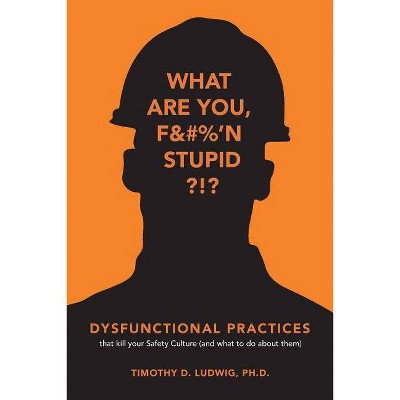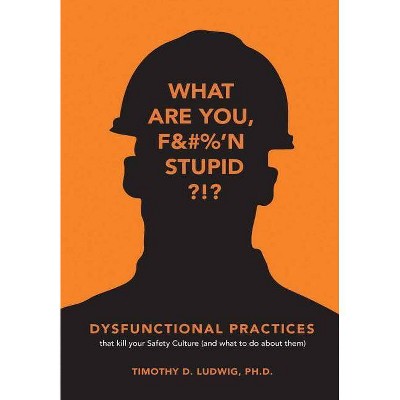Dysfunctional Practices - by Timothy D Ludwig Ph D (Paperback)

Similar Products
Products of same category from the store
AllProduct info
<p/><br></br><p><b> Book Synopsis </b></p></br></br><p>(Alternate cover available. Choose "See all formats" and choose the April edition of the book)</p> <p> A MAN FINDS HIMSELF on the top step of a step ladder; a woman removes the guard to her machine; a worker is not wearing her safety glasses in the plant; a roustabout uses the wrong sized clamp instead of retrieving the right tool from the supply truck; a supervisor teaches a new worker to take short cuts; a mechanic climbs on top of the active machine to find the oil leak. Why do these folks do these things? Is it because they are stupid?</p> <p>One tendency is to blame workers for safety errors and label their personal failings as the cause of the error. Labeling does not solve problems that cause error and, frankly, it may all be an illusion of human perception leading us to false conclusions. Our human tendencies result in interactions that hurt the safety of our workers and the effectiveness of the systems we put in place to protect them. </p> <p>These tendencies build dysfunctional management practices that create fear associated with your safety programs. I want to teach you a better way to analyze the behaviors of your employees to understand why they were put in a position to take the risk in the first place. Your system may be perfectly designed to promote risks and create safety traps. By analyzing the context of behavior we can discover ways to change your system to optimize safe behavior and reduce injury. This book presents new ideas and methods using stories we can all relate to.</p> <p>Human behavior is at the crux of your safety program. Physics and chemistry create hazards ready to be released when things go wrong. Human behavior happens right before that release. Therefore, we look at the behavior associated with the resulting injury and blame the person as the root cause. We label the person "stupid" and feel we have solved the problem. We haven't. Instead, a dysfunctional practice creeps into our safety management system blinding us from finding the true root causes of at-risk behavior. If our goal is to create a safety culture in which workers are engaged with situational awareness, peer coaching, and reporting, we will fail. Our offensive labeling will create avoidance of the very engagement we desperately need from our workers. </p> <p>We can't fix people, let's not be that pompous. But we can change behavior... we know how; there is a science behind it. We want to define behaviors in a way that are as open to unbiased analysis as the elements of physics and chemistry. Behavior is not a static variable of study. It's not a geologic formation changing over the epoch of time. Behavior is a dynamic variable, reacting with each passing moment along predictable paths, like water in a river, but always ready and able to jump its banks and forge new paths. </p> <p>We will discover that behavior is neutral, not good or bad, right or wrong. We will learn that for every safe behavior you want from your workers, there are a plethora of competing alternative behaviors that can put them at-risk. What determines this decision is predominantly the work context and your management systems. </p> <p>With this perspective we can better ask what put the worker in a position to take the risk. We will build an alternative to labeling with dispassionate, actionable and effective analyses to help build the system that helps workers discriminate the best behaviors for the situation.</p> <p>This book is for managers who seek to shape their safety culture to drive out fear and engage their workforce as they drive out risk. I want to help leaders at the top break through their biases and look at safety through a different, more effective lens. Similarly, this book is for the noble safety professional who must build safety management systems to avoid biases and other human tendencies; systems that focus on the controls, senior leadership involvement, and adequate safety resources that shape and maintain safe behaviors<p/><br></br><p><b> About the Author </b></p></br></br>Timothy Ludwig earned his Ph.D. at Virginia Tech researching the benefits of employee-driven behavioral safety programs under E. Scott Geller, and continuing his post-doctoral work in industrial engineering studying applications of W. Edwards Deming to quality and safety improvement. Dr. Ludwig is a Distinguished Graduate Professor at Appalachian State University. Dr. Ludwig's teaching has been recognized with the North Carolina University Board of Governors' Excellence Award and has been inducted into his University's Academy of Outstanding Teachers. One of his favorite activities is presenting keynotes, where his teaching skills can deliver meaningful messages to educate and inspire. To this end, Dr. Ludwig has delivered more than 100 keynote speeches internationally. Dr. Ludwig's popular website Safety-doc.com is a content-rich resource of safety culture stories, blogs, research, videos, and services. Dr. Ludwig is the author of dozens of scholarly articles that empirically document the successes of methods to improve safety and quality in industry through behavior-based solutions. His books include Intervening to Improve the Safety of Occupational Driving; Behavioral Systems: Understanding Complexity in Organizations; Behavioral Science Approaches to Process Safety: A Response to Industry's Call; and Dysfunctional Practices that Kill your Safety Culture. Dr. Ludwig serves on the Board of the Cambridge Center for Behavioral Studies whose mission to advance the scientific study of behavior and its humane application to the solution of practical problems, including the prevention and relief of human suffering. Dr. Ludwig serves on the Cambridge Center's Commission for the Accreditation of Behavioral Safety Programs that seeks to recognize and share the best practices of the very top performing behavioral safety programs in the world. Dr. Ludwig founded and directs the Appalachian Safety Summit, bringing internationally-renowned behavioral safety experts to an intimate mountain setting. Dr. Ludwig has more than 30 years of experience in research and practice in behavioral safety. He integrates empirical findings into his safety consulting. Dr. Ludwig has been around the world in his consulting practice with over 50 companies helping assess, design, and implement safety and quality improvement programs worldwide.
Price History
Price Archive shows prices from various stores, lets you see history and find the cheapest. There is no actual sale on the website. For all support, inquiry and suggestion messages communication@pricearchive.us



















